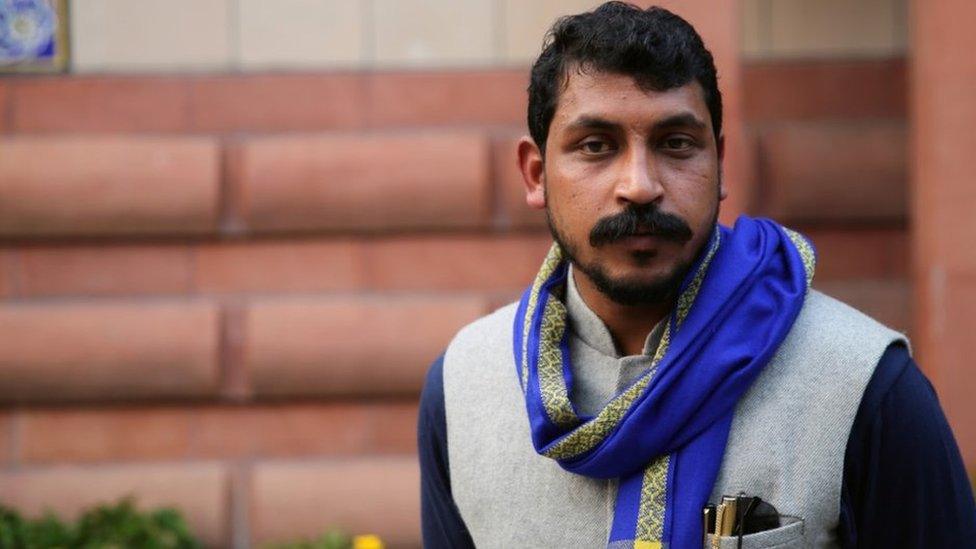India election 2019: 13-17 May the week that was
- Published
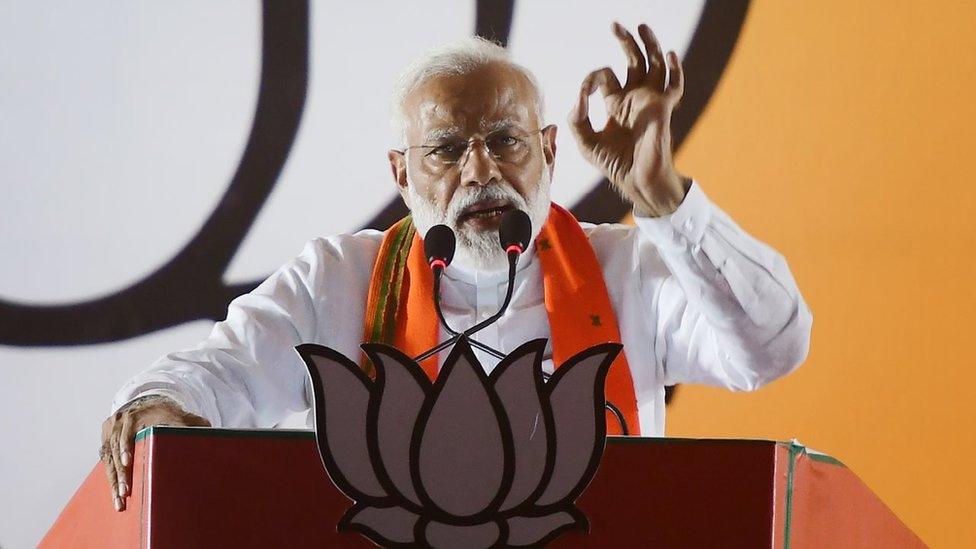
Mr Modi said he will not forgive Pragya Thakur
India is in full election mode: voting began on 11 April, and the final ballot will be cast on 19 May with results out on 23 May. Every day, the BBC will be bringing you all the latest updates on the twists and turns of the world's largest democracy.
On Friday, PM Modi held his first press conference...sort of
What happened?
Indian Prime Minister Narendra Modi attended his first ever press conference at the Bharatiya Janata Party (BJP) head office in Delhi - days before Indians took part in the final stage of voting.
But journalists were left disappointed as he did not take any questions, and instead largely talked about his government's achievements.
"I have come to thank the country for blessing me. I have seen a lot of ups and downs but the country stayed with me," he said.
Mr Modi was seated next to party president Amit Shah. He said he would not take questions because the press conference was Mr Shah's.
Earlier, the prime minister said he would "never be able to forgive" those who have "insulted" Mahatma Gandhi.
Mr Modi's statement comes after controversial Bharatiya Janata Party (BJP) politician Pragya Thakur called Nathuram Godse - the man who assassinated Mahatma Gandhi - a "patriot".
Ms Thakur apologised after several leaders, including those from the BJP, criticised her.
"Such statements should be condemned. There is no place in society for such comments. She [Ms Thakur] may have apologised, but I will never be able to forgive her," he said in an interview to News24 TV channel.
Why does this matter?
This is the first time Mr Modi attended a press conference as prime minister while in India. Most of his press conferences have been on state visits to other countries and often involved little more than reading out an official statement.
He has given some one-on-one interviews to Indian media, though critics say that these have largely been tightly controlled and given to journalists seen as sympathetic to him. However in recent weeks he has given a flurry of interviews to several leading publications and television channels, including those that have been critical of him.
But if people were expecting a complete about-turn in his media policy this time, they would have been disappointed.
This caused some frustration among journalists on Twitter.
Allow X content?
This article contains content provided by X. We ask for your permission before anything is loaded, as they may be using cookies and other technologies. You may want to read X’s cookie policy, external and privacy policy, external before accepting. To view this content choose ‘accept and continue’.


Also on Friday, a BJP candidate apologised for calling Gandhi's killer a patriot
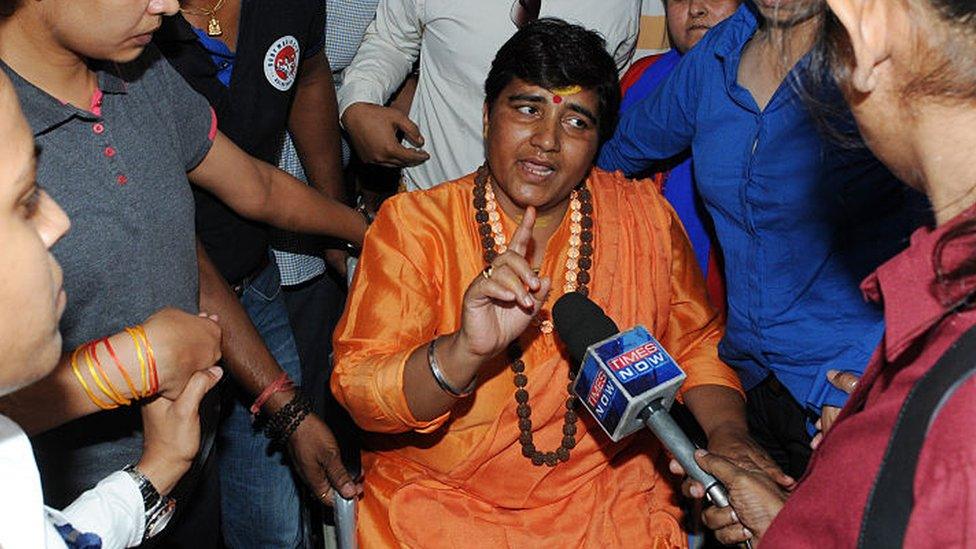
What happened?
Bharatiya Janata Party (BJP) politician Pragya Thakur apologised after calling Nathuram Godse - the man who assassinated Mahatma Gandhi - a "patriot".
Several political parties had criticised her comment and her own party demanded that she publicly apologise.
"It was my personal opinion. My intention was not to hurt anyone's sentiments. If I've hurt anyone, I do apologise. What Gandhi Ji has done for the country cannot be forgotten. My statement has been twisted by the media," Ms Thakur said on Thursday evening.
She made the comment after actor-turned politician Kamal Haasan said Godse was India's first Hindu "extremist" earlier this week.
Why does this matter?
The BJP as well as opposition parties immediately reacted to her comment, which also caused a storm on social media.
BJP spokesperson GVL Narasimha Rao said that the party does not agree with her statement, and asked her to publicly apologise.
The main opposition Congress party demanded an apology from Prime Minister Narendra Modi and said that the BJP should take "punitive action" against Ms Thakur.
Congress spokesperson Randeep Surjewala said that "insulting martyrs is in the BJP DNA" and that the "soul of the nation" had been hurt by her remarks.
Congress party leader Priyanka Gandhi also lashed out at the BJP.
Allow X content?
This article contains content provided by X. We ask for your permission before anything is loaded, as they may be using cookies and other technologies. You may want to read X’s cookie policy, external and privacy policy, external before accepting. To view this content choose ‘accept and continue’.
Political analysts said that her comments have put the BJP in a tough spot, since Mr Modi and BJP president Amit Shah defended their decision to field her as a candidate despite terror charges against her.
Her candidature caused outrage as she is an accused of involvement in a blast that killed seven people and injured 100 others. Ms Thakur denies all charges against her.
Allow X content?
This article contains content provided by X. We ask for your permission before anything is loaded, as they may be using cookies and other technologies. You may want to read X’s cookie policy, external and privacy policy, external before accepting. To view this content choose ‘accept and continue’.
However, Ms Thakur's comments reflect the views of some right-wing Hindus who support the BJP and have long seen Gandhi as too moderate.
Godse, who shot Gandhi in the chest three times at point-blank range on 30 January 1948, was also an activist with nationalist right-wing groups, including those closely associated with the BJP.
Hindu hardliners in India accuse Gandhi of having betrayed Hindus by being too pro-Muslim, and even for the division of India and the bloodshed that marked Partition, which saw India and Pakistan created after independence from Britain in 1947.

On Thursday, a ruling party candidate called Gandhi's killer a patriot....
What happened?
Controversial Bharatiya Janata Party (BJP) politician Pragya Thakur made headlines again. This time it was for calling Nathuram Godse - the man who assassinated Mahatma Gandhi - a "patriot".
Her comment was made in response to a statement by southern actor-turned politician Kamal Haasan who had said India's first "extremist" was a Hindu", referring to Godse.
Allow X content?
This article contains content provided by X. We ask for your permission before anything is loaded, as they may be using cookies and other technologies. You may want to read X’s cookie policy, external and privacy policy, external before accepting. To view this content choose ‘accept and continue’.

His statement, made on Monday, was heavily criticised by the BJP, which accused him of indulging in "divisive politics" and filed a complaint against him with the Election Commission of India.
Why does this matter?
The BJP responded by criticising Ms Thakur and asking her to publicly apologise.
"BJP does not agree with this statement, we condemn it. Party will ask her for clarification, she should apologise publicly for this statement," party spokesperson GVL Narasimha Rao told reporters.
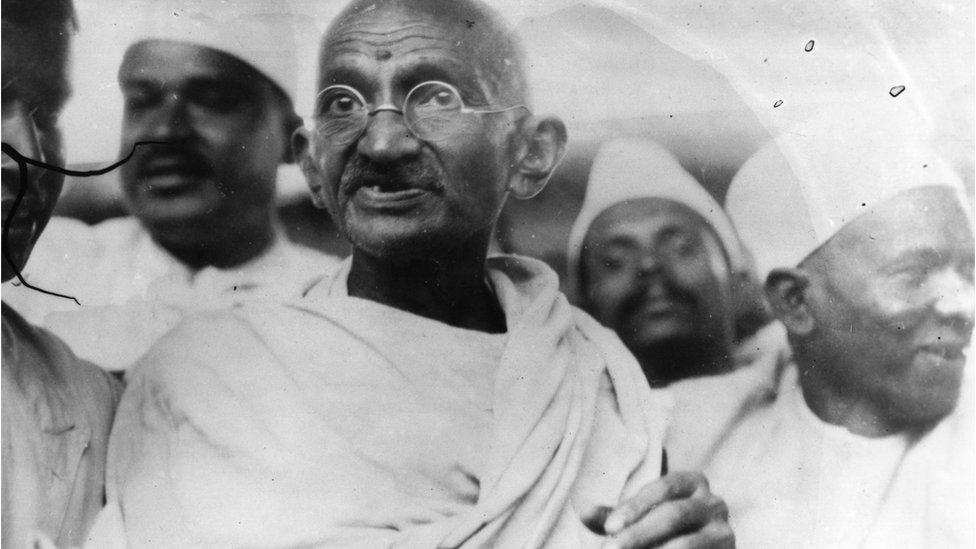
Ms Thakur has seen her fair share of controversy. Her candidature caused outrage as she is an accused of involvement in a blast that killed seven people and injured 100 others. On 18 April, she said that police officer Hemant Karkare had died in the November 2008 Mumbai terror attacks because she had "cursed" him. She was then banned from campaigning for 72 hours as a result.
A team led by Mr Karkare had arrested her for questioning in connection with the Malegaon blast.
During her campaign, she also said she was "proud" of her part in the demolition of the 16th Century Babri mosque. In 1992, right-wing Hindu mobs razed the mosque to the ground, claiming it was built on the site of a temple destroyed by Muslim rulers. The site, which is in the city of Ayodhya, has been a religious flashpoint for Hindus and Muslims for decades.

And campaigning ended in West Bengal a day before deadlinec
What happened?
The Election Commission (EC) told political parties to end their campaigning in West Bengal state, a day before the deadline in the wake of poll-related violence.
The campaign ended on Thursday at 10pm local time, and voting was held on Sunday.
The decision came after clashes broke out between the Bharatiya Janata Party (BJP) workers and protesters believed to be from the state's governing Trinamool Congress (TMC) in Kolkata (formerly Calcutta) on Tuesday.
It happened during a roadshow of BJP chief Amit Shah. Several people were injured and vehicles were set on fire. A statue of renowned Bengali reformer Iswarchandra Vidyasagar was also vandalised in the clashes.
Both parties accused each other of starting the violence.
Why does this matter?
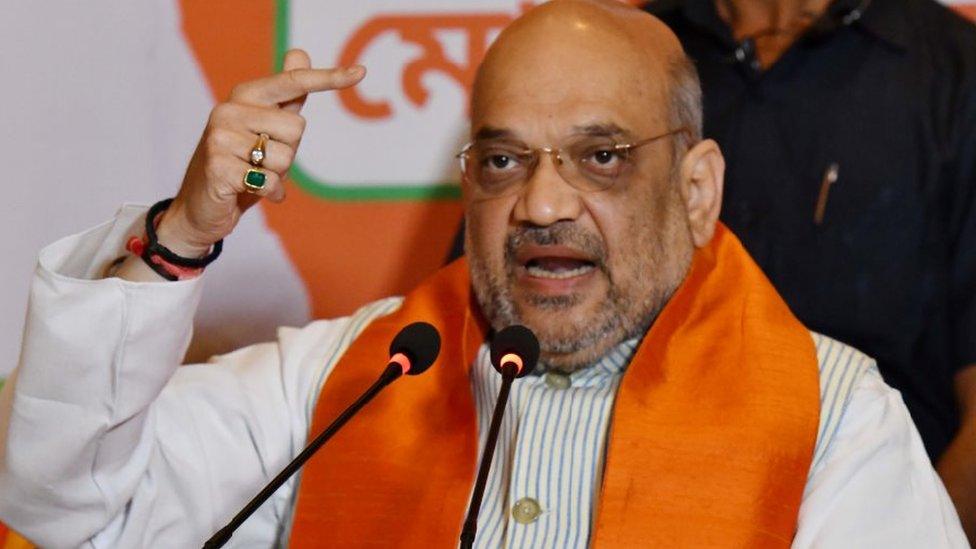
Violence took place during BJP chief Amit Shah's rally in Kolkata on Tuesday
The BJP welcomed the decision, saying it validated their argument that the state had "descended into anarchy" under the leadership of chief minister Mamata Banerjee.
Ms Banerjee said that the move was "undemocratic" and "it had insulted the people of Bengal".
"Tomorrow, [Prime Minister Narendra] Modi has two meetings in Bengal. When he finishes, the campaigning also ends... Instead of punishing Amit Shah, the Election Commission has given a gift to the BJP," she said.
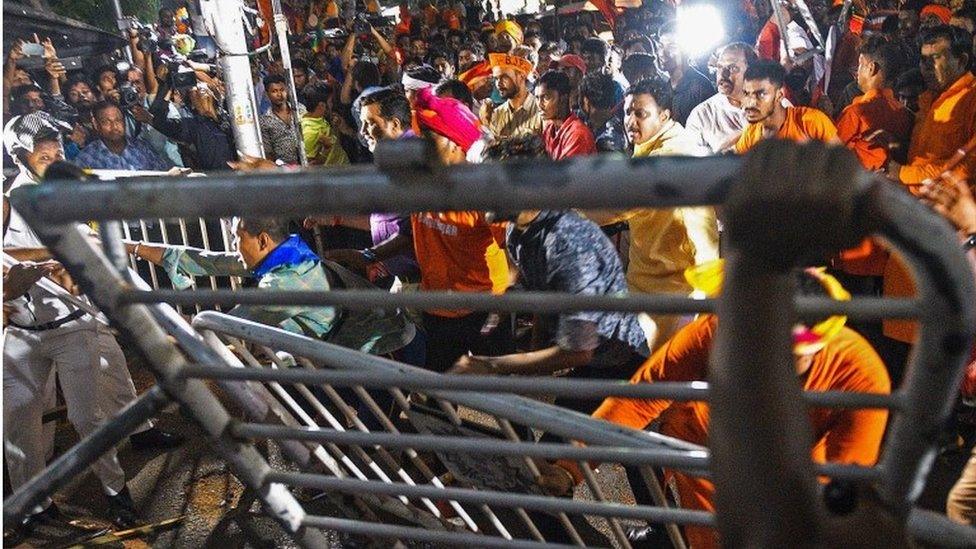
Several people were injured and vehicles were set on fire during the violence
Both parties are locked into a fierce election battle to win most of West Bengal's 42 seats. Ms Banerjee has ambitions of becoming the prime minister in case a nationwide coalition of regional parties wins enough seats.
The state has also become crucial for the BJP as it's trying to expand its reach in the eastern state. It won only two seats here in the 2014 election.
The BJP performed well in northern states like Uttar Pradesh and Rajasthan in 2014, but this time it's expected to suffer loses against a coalition of regional parties and the main opposition Congress.
So the party is trying to make up for the losses in West Bengal.

On Wednesday, the TMC and the BJP accused each other of poll violence
What happened?
The war of words between West Bengal state chief minister Mamata Banerjee and the governing Bharatiya Janata Party (BJP) intensified ahead of voting on Sunday.
The latest verbal duel came after violence was reported during BJP chief Amit Shah's roadshow in Kolkata (formerly Calcutta) on Tuesday.
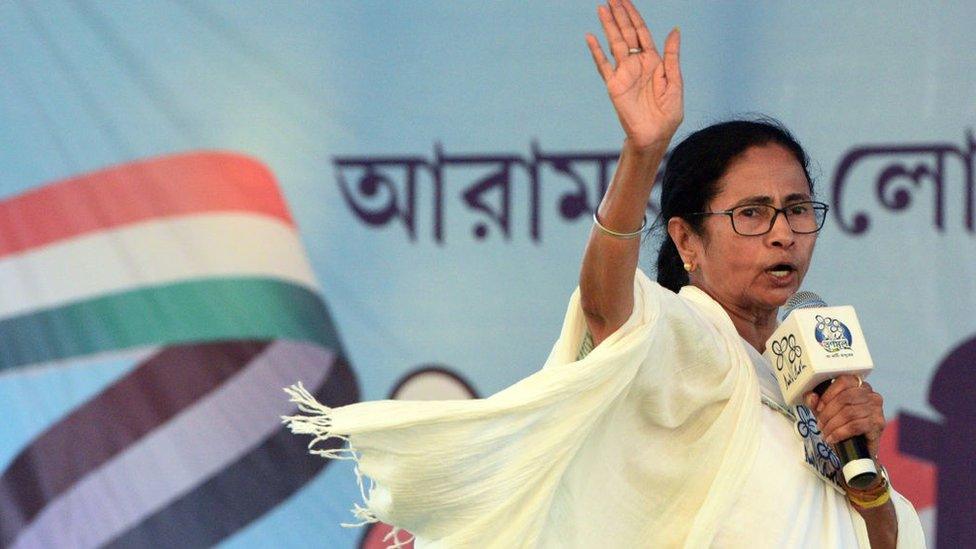
Clashes broke out between BJP supporters and protesters who were holding "Amit Shah go back" posters.
Some people suffered minor injuries and a few vehicles were set on fire.
The BJP said the protest was "orchestrated" and called it an "attempt to strangulate democracy".
Why does this matter?
The eastern state has become politically crucial for the BJP as it has intensified campaigning in the past few days.
And that has sparked a feverish electoral battle between the BJP and Ms Banerjee's Trinamool Congress (TMC).
"What does Amit Shah think of himself? Is he above everything? Is he god that no one can protest against him?" Ms Banerjee said.
In reply, Mr Shah accused the TMC of not following democratic norms during elections.
"Have faith in the people of Bengal that they'd face the TMC goons," he said.

On Tuesday, the saga of the morphed Mamata meme continued...
What happened?
India's top court stepped in to release an activist belonging to India's governing Bharatiya Janata Party (BJP) who was sent to prison for sharing a doctored image of West Bengal Chief Minister Mamata Banerjee.
Priyanka Sharma was sentenced to two weeks in prison on 10 May after she shared a picture of Bollywood star Priyanka Chopra and her husband Nick Jonas at the Met Gala - but with Ms Banerjee's head superimposed on to Chopra's body.
Earlier the court had said Ms Sharma could be released only if she apologised to Ms Banerjee, but later waived this condition.
Why does this matter?
The battle for West Bengal in this general election has been absolutely bruising.
The BJP, led by Prime Minister Narendra Modi himself, has been campaigning hard for votes in the state. This has brought them toe-to-toe with the state's feisty chief minister. The fact that voting for West Bengal's 42 seats has been split across all nine phases of voting has meant that the battle has been long and drawn-out.
And with just one phase to go before voting finally ends, the gloves were well and truly off. The two parties had traded insults on the campaign stage, their workers had attacked each other, and the violence on the ground intensified. And the battle spread to cyberspace as well.
The country's finance minister Arun Jaitley jumped at news of Ms Sharma's release to call Ms Banerjee a dictator.
Allow X content?
This article contains content provided by X. We ask for your permission before anything is loaded, as they may be using cookies and other technologies. You may want to read X’s cookie policy, external and privacy policy, external before accepting. To view this content choose ‘accept and continue’.
Analysts say that this political row is so bitter because the BJP has clearly identified West Bengal as one of the states where they may be able to make gains this election. This becomes more important for the party in the context of their fight in the politically crucial state of Uttar Pradesh, which sends the most number of MPs (80) to parliament.
They are up against a powerful coalition of regional parties there, and many expect them to lose seats as a result.

And PM Modi said Rahul Gandhi should be ashamed of 1984 riots
What happened?
Prime Minister Narendra Modi said that main opposition Congress party chief Rahul Gandhi should be "ashamed of himself" over his colleague's remark on the 1984 anti-Sikh riots.
Mr Modi was replying to a controversial statement made by Sam Pitroda, who is a strategist of the Congress party.
In his reply to a question about the Congress' role in the riots, Mr Pitroda had said "so what?".
"I don't think so, this is also another lie, and what about 1984? You speak about what you [Mr Modi] have done in five years. It [the riots] happened in 1984, so what?" he said.
Mr Gandhi said he was "ashamed" of Mr Pitroda's statement, and asked him to apologise.
Mr Pitroda later said his statement was "twisted" and he did not mean to hurt sentiments.
But Mr Modi said the Congress chief "must apologise".
"I was watching that naamdar [the dynast] told his guru that he should be ashamed of what he said. I want to ask naamdar, you pretended to scold your mentor for what? Because he exposed what was always in the Congress's heart, and in the discussions of the naamdar family? Because he made public a family secret? Naamdar, it is you who should be ashamed," Mr Modi said.
Why does this matter?
The controversy matters because it came days ahead of voting for the 13 seats in the northern state of Punjab.
And both parties appeared to be trying to come across as pro-Sikh ahead of the vote on 19 May.
The BJP, which formed a coalition with regional Shiromani Akali Dal, is locked in a bitter electoral battle with the ruling Congress in the state.
Sikhs are a majority in the state and the 1984 riots are still an emotional issue for many of them.
More than 3,000 Sikhs were killed in the violence after the assassination of former prime minister Indira Gandhi by her Sikh bodyguards.
They were angry at her decision to send the army into the Golden Temple - Sikhism's holiest shrine - to flush out militants earlier in the year.
The killing of Mrs Gandhi, who belonged to the Congress, saw mobs attack and murder members of the Sikh community across the country.

On Sunday, Delhi voted but not enthusiastically
What happened?
Sunday saw India's capital Delhi vote along with several other states in the polls - the penultimate phase of the country's mammoth general election.
Voters turned out to vote, but in fewer numbers than they did in 2014. The election commission said that around 60% of the capital's registered voters had actually cast ballots, which was about a five percent drop from 2014.
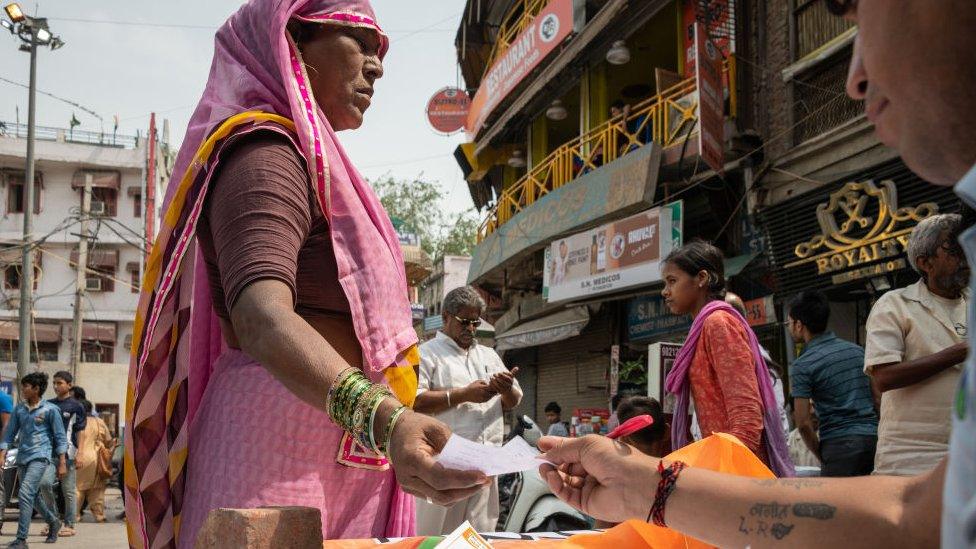
Delhi's voter turnout was lower than in 2014
Delhi's Chief Electoral Officer, Ranbir Singh, expressed disappointment, saying that the turnout did not match expectations.
Why does this matter?
The election commission was right to be disappointed - it had run a series of campaigns in the city, encouraging more people to vote.
But it was not as though polling in Delhi was an entirely smooth process. Some voters complained that their names were missing from electoral lists even though they had all the necessary documents. There were also reports that around 1,200 Electronic Voting Machines (EVMs) had malfunctioned across the city, delaying the polling process.
The fact that Delhi became a three-cornered contest after the main opposition Congress and the Aam Aadmi Party (AAP), which controls the Delhi state assembly, failed to stitch up an alliance may also have put voters off. Many analysts believe that this failure will only split voters who were against prime minister Narendra Modi's Bharatiya Janata Party (BJP) and effectively hand them victory.
So they may have decided to just stay home, and not bother queuing up in the blistering heat - it touched 40C on Sunday.

India votes 2019

Coverage from previous weeks:
6-10 May: PM Modi goes after Rajiv Gandhi and Rahul Gandhi apologises to the Supreme Court of India
1-5 April: Congress presents manifesto and Facebook does a political purge
18-22 March: PM Modi's space address and Congress' ambitious income scheme
11-15 March: From Priyanka Gandhi's debut to a contentious UN vote

How do you vote in the election?
Here's a video explaining everything that happens inside a polling station - and what happens to your vote after that:
Journey of a vote


- Published26 September 2018
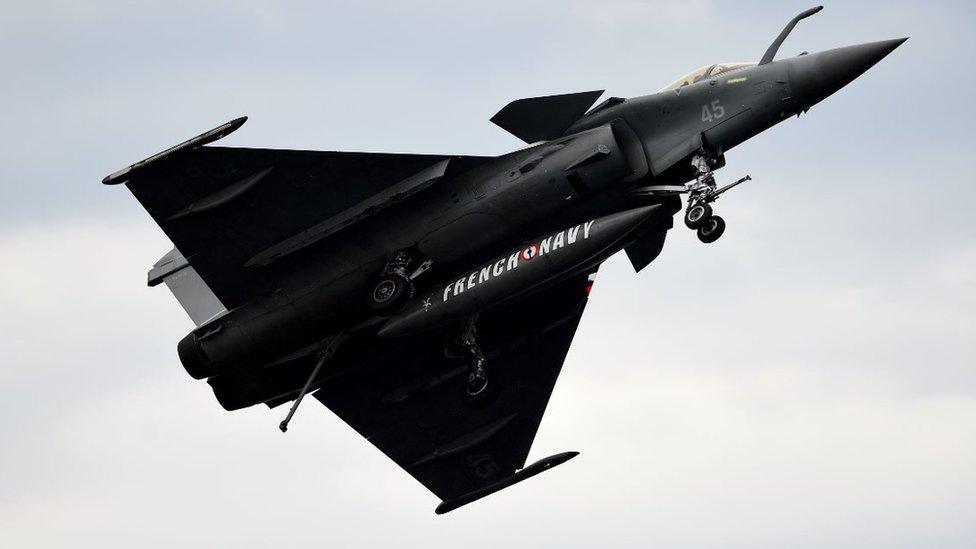
- Published10 April 2019
- Published2 April 2019
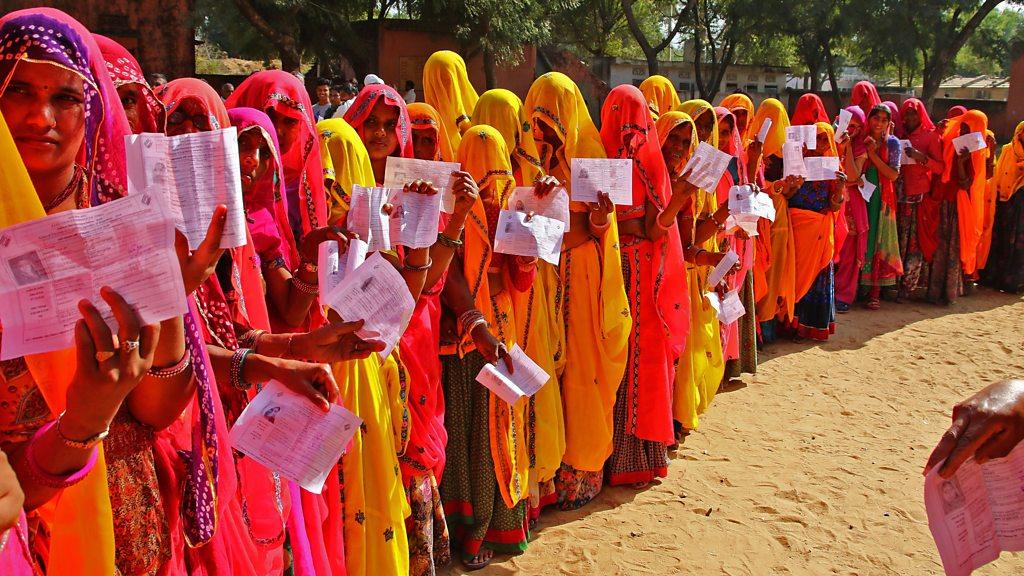
- Published22 May 2018
- Published8 June 2017
- Published11 March 2019
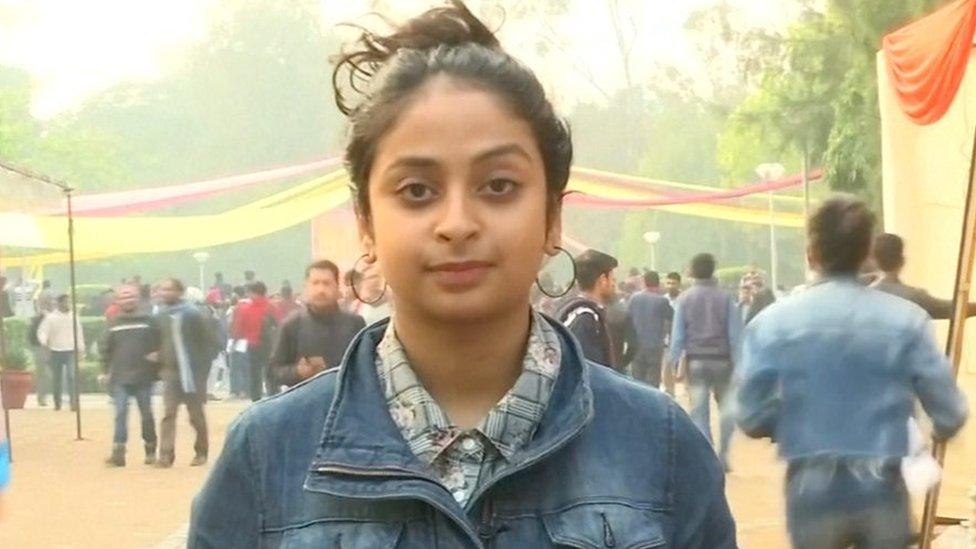
- Published18 March 2019
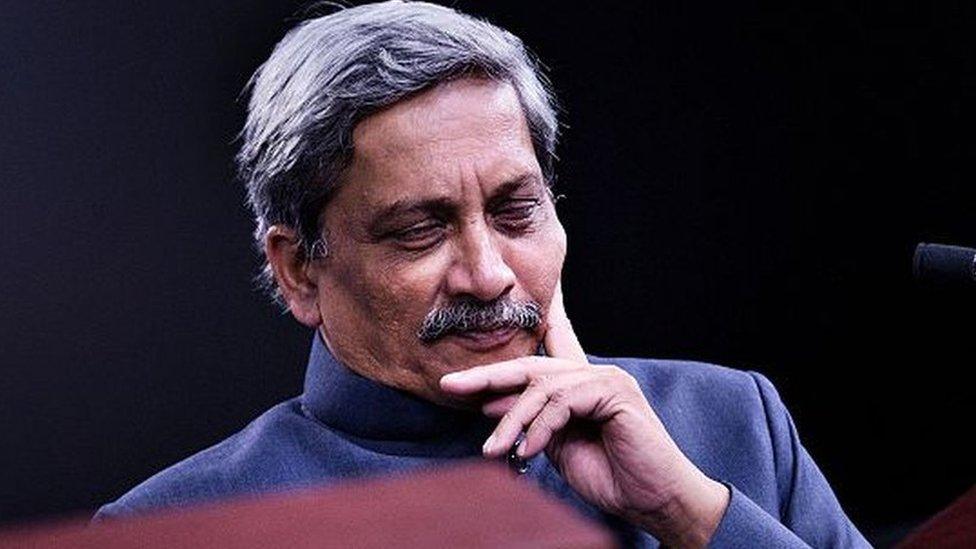
- Published12 December 2018
- Published20 March 2019
